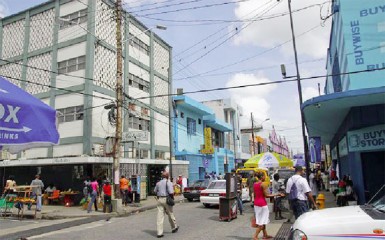“Tenderpreneurs are people who (ab)use power, influence and their network of contacts to win state contracts for their personal enrichment. The word is a portmanteau of ‘tender’ and ‘entrepreneur’, a new label for a commonly observed subspecies of businessman, the state-dependent businessman.”
In a July 8 Trinidad Extress article the writer, Ralph Balgobin,

sought to explore the parameters of the practice which he describes as “tenderpreneurship… one of those singularities we meet on the descending road to kleptocracy.”
Popularly defined as “rule by thieves”, Balgobin said that in practice tenderpreneurship manifests itself “where the ruling class uses the government as a vehicle for increasing members’ wealth, power and social standing.
Though not known by the same title here in Guyana, the arguments are startlingly similar to those being made in local political and even diplomatic circles about the manifestations of official corruption. It is widely believed that there is endemic manipulation of state tender processes to facilitate the positioning of insiders to win lucrative contracts; various forms of under the table payments to public officials and overpayments to contractors that occur as a common feature of tender administration.
While the manipulation of the tender process here in Guyana is faithfully documented annually in the Report of the Auditor General, the authorities show no inclination to stop it.
Balgobin asserted that “tenderpreneurship extends the power of the state far into the economy… by making political relationships the core strengths of a business.” This precise discourse is currently raging in Guyana.
Balgobin said that a second feature of tenderpreneurship is that its main players see nothing wrong with their behaviour. “This is a cultural problem,” he said.
The “so what wrong with that” syndrome “builds the wrong competences in our business class, which in turn encourages the corruption of the leadership of political class, key people in institutions like Customs and Excise, Licensing, Immigration and Ministries, Balgobin’s article said. Bribery and ‘pardnering’ help with the misclassification of imports as well as under-invoicing, the crony capitalist’s instruments of choice to avoid paying tax, he added.

According to Balgobin, in Trinidad and Tobago, “once the bastion of public funds protection; the public service is a shadow of its former self as a result of cancerous political and business corruption.” The identical argument has been made about the public service in Guyana.
According to Balgobin, the practices associated with “tenderpreneurship” have the effect, over time, of maximising the participation of the state in the economy while business and entrepreneurship “are crowded out”. Those that remain “become really good at politics and corruption” in order to survive.
The upshot of all this, Balgobin said, is that local firms that depend on state business are hardly, if ever, globally competitive. “There seems to be reduced likelihood of developing the competences required for global competitiveness in areas like branding, R&D, human development etc,” Balgobin said.
Tenderpreneurship has, over the years, created “unworthy millionaires,” he noted; a not dissimilar argument to one that has become increasingly current here in Guyana.
Arguably, equally applicable to Guyana is Balgobin’s reference to “the obnoxious and inebriated display of new wealth by people who very obviously have deep political connections.”




